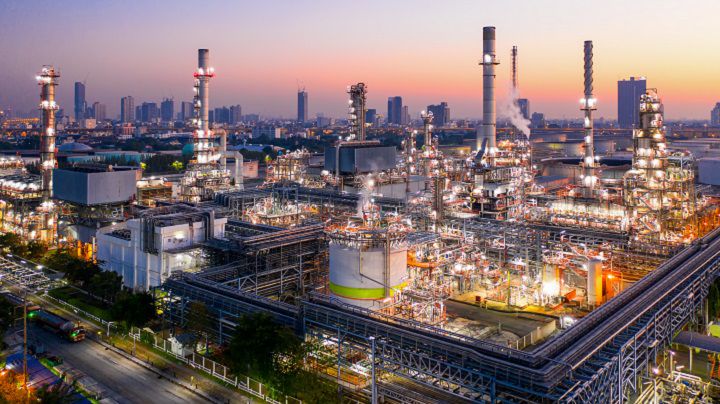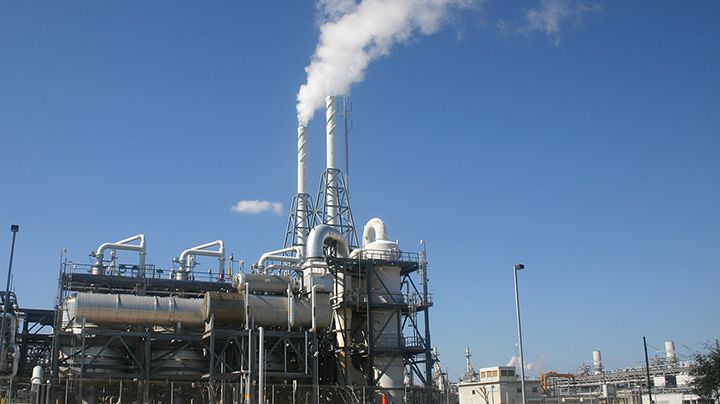Protect your cooling tower and increase plant operating efficiency with DuPont’s advanced water treatment technologies
Cooling tower systems recirculate water to remove heat generated from a variety of industrial processes. Cooling tower make-up water is needed to replace water lost in a cooling cycle after its evaporation and the blowdown required to control solids buildup. Surface water from rivers or lakes is generally used as a source for cooling tower make-up water.
The primary objectives of cooling water treatment are to maintain the operating efficiency of the cooling water system and to protect the equipment that contacts the cooling water. If cooling tower make-up water is not properly treated or maintained, corrosion, scale and solids deposition can occur. This may cause system downtime, reduced equipment efficiency, the need for equipment replacement, and may increase the risk of disease from pathogenic microorganisms.
Depending on the region, water source, and cooling tower type, a number of technologies may be required to treat make-up water before it enters the cooling tower system. A treatment process typically includes suspended solids removal, dissolved solids removal, softening, pH adjustment, dosing of biocides for bacterial control, and anticorrosion agents. DuPont offers a variety of technologies and solutions to meet your specific cooling tower make-up water treatment goals.
DuPont multi-tech solutions for cooling tower make-up water treatment
Pretreatment with Ultrafiltration
DuPont Ultrafiltration (UF) is a pressure-driven purification process that separates particulate matter from soluble compounds using an ultrafine membrane media. Compared to traditional media and sand filters, UF technology offers: better & consistent filtrate quality regardless feedwater quality upsets; minimum to no use of pretreatment chemicals (polymers, coagulants, pH adjustment) and associated costs for sludge disposal; smaller footprint and lower weight. DuPont offers a wide selection of UF modules, skids, and systems that provide industries with peace-of-mind solutions to address their challenges while maintaining lowest total cost of ownership and managing a reliable and profitable operation.
Total Organic Carbon Removal with Ion Exchange Resins
DuPont™ AmberLite™ SCAV Resins are organic traps that remove natural organic matter from feedwater to protect the demineralization system from fouling related operational issues and also reduce TOC in the treated water.
Softening & Dealkalization with Ion Exchange Resins
DuPont™ AmberLite™ ion exchange softening resins remove cations associated with hardness (such as Ca and Mg) from feedwater to avoid scale formation caused by precipitation of sparingly soluble salts like calcium carbonate. Ion exchange resins (IER) can also remove bicarbonate alkalinity associated with scaling.
View all Pretreatment products
Demineralization with Ion Exchange Resins
DuPont™ AmberLite™ ion exchange resins for demineralization are used to remove all cations, anions, and large organic contaminants from feed water. DuPont has over 80 years of experience manufacturing the widest range of industry-leading, reliable ion exchange resins in world-class manufacturing facilities.
Demineralization with Reverse Osmosis Brackish Water Elements
FilmTec™ reverse osmosis (RO) elements are pressure-driven purification products that separate ions, dissolved salts, and minerals using a semi-permeable membrane. We provide the most comprehensive portfolio of high-quality, top-performing RO technology in the world, trusted globally by many industrial customers for over 40 years.
- FilmTec™ Prime RO Portfolio: the next generation of FilmTec™ brackish water RO elements designed specifically for industrial utility water treatment.
- FilmTec™ ECO RO Portfolio: FilmTec™ ECO Elements offer excellent rejection with significantly lower energy and reduced chemical consumption than traditional.
- FilmTec™ Fortilife™ RO Portfolio: this product family is designed for industrial-users who need to treat challenging water. FilmTec™ Fortilife™ CR100 element is designed to treat water highly prone to biofouling. The FilmTec™ Fortilife™ CR200 element can cope with the combined challenge of biological and organic fouling prone waters.
High Recovery Demineralization with Closed Circuit Reverse Osmosis
The patented DesaliTec™ SOAR closed circuit reverse osmosis (CCRO) system works by circulating water through a single stage of membrane elements until the desired recovery level is achieved instead of using complex traditional multi-stage methods. Brine is periodically replaced with fresh feedwater without stopping permeate flow. Recovery is flexible and can be set at the system control panel. The cross flow required for RO membrane operation is controlled with an internal circulation pump. Frequent and complete brine flushing prevents scale precipitation and disrupts biofouling, making very high recovery rates possible even from mineral-laden or contaminated feedwaters.
View all Demineralization products
-
Pretreatment
Pretreatment with Ultrafiltration
DuPont Ultrafiltration (UF) is a pressure-driven purification process that separates particulate matter from soluble compounds using an ultrafine membrane media. Compared to traditional media and sand filters, UF technology offers: better & consistent filtrate quality regardless feedwater quality upsets; minimum to no use of pretreatment chemicals (polymers, coagulants, pH adjustment) and associated costs for sludge disposal; smaller footprint and lower weight. DuPont offers a wide selection of UF modules, skids, and systems that provide industries with peace-of-mind solutions to address their challenges while maintaining lowest total cost of ownership and managing a reliable and profitable operation.
Total Organic Carbon Removal with Ion Exchange Resins
DuPont™ AmberLite™ SCAV Resins are organic traps that remove natural organic matter from feedwater to protect the demineralization system from fouling related operational issues and also reduce TOC in the treated water.
Softening & Dealkalization with Ion Exchange Resins
DuPont™ AmberLite™ ion exchange softening resins remove cations associated with hardness (such as Ca and Mg) from feedwater to avoid scale formation caused by precipitation of sparingly soluble salts like calcium carbonate. Ion exchange resins (IER) can also remove bicarbonate alkalinity associated with scaling.
View all Pretreatment products
-
Demineralization
Demineralization with Ion Exchange Resins
DuPont™ AmberLite™ ion exchange resins for demineralization are used to remove all cations, anions, and large organic contaminants from feed water. DuPont has over 80 years of experience manufacturing the widest range of industry-leading, reliable ion exchange resins in world-class manufacturing facilities.
Demineralization with Reverse Osmosis Brackish Water Elements
FilmTec™ reverse osmosis (RO) elements are pressure-driven purification products that separate ions, dissolved salts, and minerals using a semi-permeable membrane. We provide the most comprehensive portfolio of high-quality, top-performing RO technology in the world, trusted globally by many industrial customers for over 40 years.
- FilmTec™ Prime RO Portfolio: the next generation of FilmTec™ brackish water RO elements designed specifically for industrial utility water treatment.
- FilmTec™ ECO RO Portfolio: FilmTec™ ECO Elements offer excellent rejection with significantly lower energy and reduced chemical consumption than traditional.
- FilmTec™ Fortilife™ RO Portfolio: this product family is designed for industrial-users who need to treat challenging water. FilmTec™ Fortilife™ CR100 element is designed to treat water highly prone to biofouling. The FilmTec™ Fortilife™ CR200 element can cope with the combined challenge of biological and organic fouling prone waters.
High Recovery Demineralization with Closed Circuit Reverse Osmosis
The patented DesaliTec™ SOAR closed circuit reverse osmosis (CCRO) system works by circulating water through a single stage of membrane elements until the desired recovery level is achieved instead of using complex traditional multi-stage methods. Brine is periodically replaced with fresh feedwater without stopping permeate flow. Recovery is flexible and can be set at the system control panel. The cross flow required for RO membrane operation is controlled with an internal circulation pump. Frequent and complete brine flushing prevents scale precipitation and disrupts biofouling, making very high recovery rates possible even from mineral-laden or contaminated feedwaters.
View all Demineralization products
Find products for cooling tower make-up water treatment
View a list of products to protect your cooling tower.
Explore other industrial utility water applications

Our technologies and solutions are designed to help you overcome water challenges to produce your desired quantity and quality of industrial utility water.

Our boiler feed water treatment technologies can reduce asset corrosion and boiler downtime.

